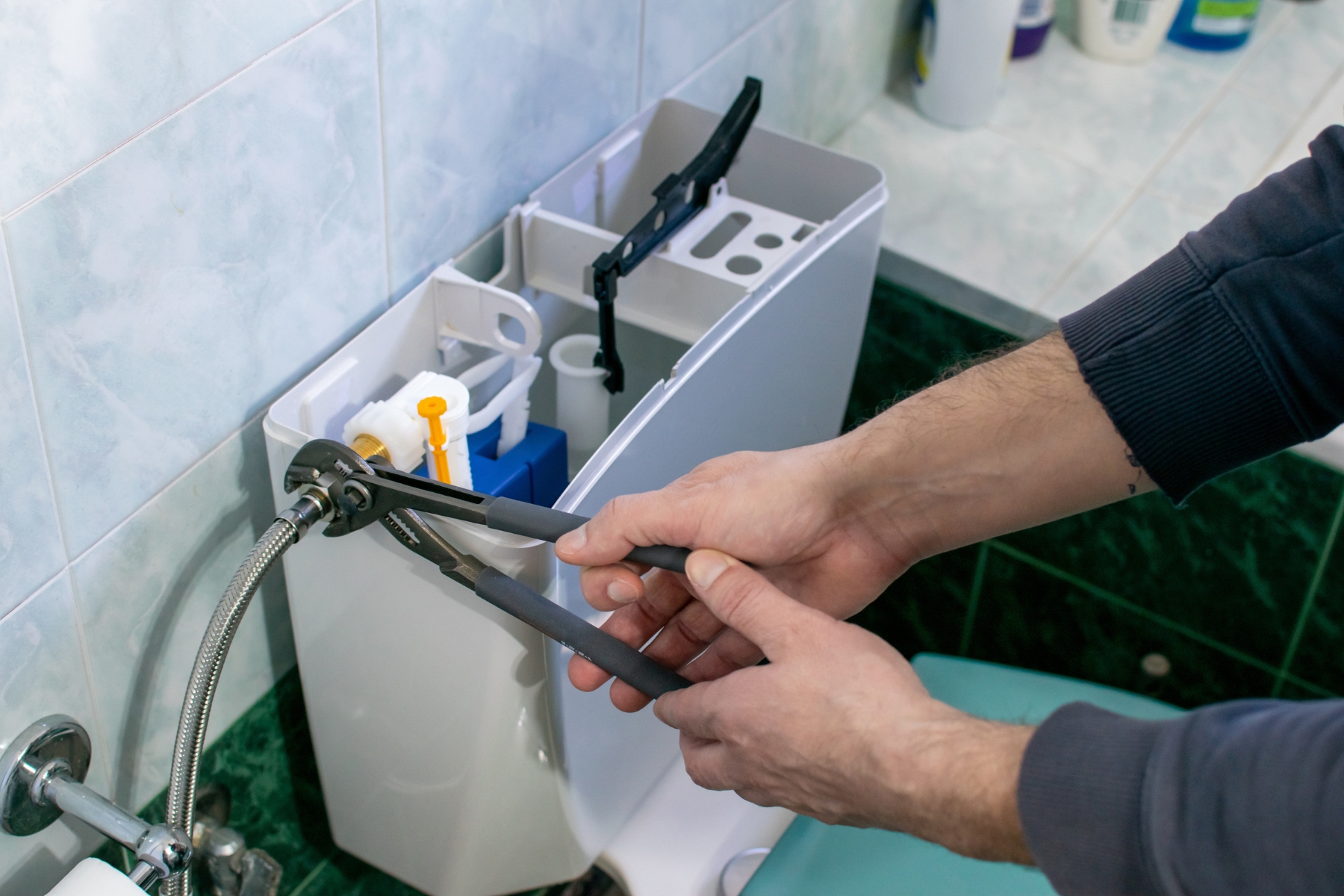
How to Turn Off the Water to Your Toilet
One of the most important aspects of being a responsible homeowner is understanding how to handle your home’s biggest and most vital systems. This includes

One of the most important aspects of being a responsible homeowner is understanding how to handle your home’s biggest and most vital systems. This includes
One of the most important aspects of being a responsible
When shopping for new appliances, you’ll have your choice of
Kitchen garbage disposals have gone from a luxury appliance to
You’ve been plotting out your perfect bathroom renovation or kitchen
*Limit one coupon per household/property. Coupons/discounts cannot be combined with any other offers. Restrictions may apply.
Legacy Plumbing HQ
1101 E Eldorado Pkwy
Little Elm, TX 75068
469-389-4020
Legacy Plumbing Frisco
15222 King Road, STE 1002
Frisco, TX 75034
972-752-6537
8:00 AM to 5:30 PM
Monday – Friday
Legacy Plumbing HQ
1101 E Eldorado Pkwy
Little Elm, TX 75068
(972) 357-1754
Legacy Plumbing Frisco
15222 King Road, STE 1002
Frisco, TX 75034
(972) 449-5879
7:30 AM to 5:30 PM
Monday – Friday
You’ve heard about the importance of hiring a “licensed plumber”. But what does that even mean? How do you find a licensed plumber near you and do you even need a license anymore to be a plumber in Texas?
Updated for 2022, this article will give you, the homeowner, everything you need to know about hiring the right plumbing company for your home.
By Texas law, an individual who wants to provide plumbing services must be properly licensed by the Texas State Board of Plumbing Examiners (TSBPE).
There are currently four different licenses issued by the TSBPE: Tradesman Plumber-Limited, Journeyman, Master, and Plumbing Inspector. There are certain requirements that one must have in order to be eligible for each of these licenses. Each prospective licensee must also take and pass an exam administered by the TSBPE. They must also keep their license current on a yearly basis.
In addition to these licenses, the TSBPE also issues different registrations (like the apprentice registration), designations (like responsible master plumber), and endorsements (like the medical gas endorsement).
Specifically regarding starting a plumbing business, the law states that: “A person or company shall not advertise, contract for or otherwise offer or agree to perform plumbing work for or provide plumbing services to the public unless the person or company has secured the services of at least one RMP holding a current Master Plumber License.”
To summarize, every plumbing company in Texas (whether a big company or a one-man show) must have a licensed, insured Responsible Master Plumber overseeing the business. Furthermore, all of the plumbers who work for the company must have either a Tradesman or a Journeyman license. Finally, the licensed plumbers can have registered apprentices help them as long as they are directly supervising the work.

The state of Texas’s plumbing regulations made national news in 2019 over some drama surrounding the Texas Sunset Advisory Commission.
This organization (set up in 1977 by the Texas Legislature) basically audits government agencies (like the TSBPE) by giving them expiration dates (typically 12 years). When an agency’s expiration date is nearing, Sunset scrutinizes whether this agency is still needed and gives recommendations for what legislative action needs to take place. The purpose of the Sunset process is to keep government agencies from becoming “inefficient, intrusive, burdensome, and outdated”.
The TSBPE was set to expire in 2019 and needed legislation to be passed in order to continue to exist. When Sunset reviewed the TSBPE and gave their recommendations, they actually suggested that the TSBPE should be disbanded and all of the plumbing licensing and oversight responsibilities should be transferred to another existing agency: the Texas Department of Licensing and Registration (TDLR)
For various reasons, this recommendation proved to be very controversial. In the midst of the political scuffle that ensued, there was no legislation actually passed by the 2019 legislative session that would either renew the TSBPE OR transfer its responsibilities to the TDLR.
As a result, it looked for a while like the TSBPE was going to automatically expire on September 1st, 2019 and leave Texans with no plumbing licensing agency or regulations. This was a big deal!
This deregulation was curtailed in June of 2019 when Governor Greg Abbott issued an executive order that extended the TSBPE until May of 2021 when it could then be either renewed or disbanded by the Texas legislative session.
Fast-forward to May of 2021 when House Bill 636 officially passed after months of back-and-forth. This bill officially authorized the TSBPE to continue until 2027 and gave provisions to improve some of the issues which Sunset had pointed out.
Long story short: Although for a short time in 2019 it looked like plumbing licensing would be deregulated in Texas, this actually never happened. Plumbing companies and licenses are still governed today in virtually the same way they were before 2019.
Without going into the politics of it, there are many reasons why most plumbers are passionate about plumbing regulation.
For context, the third deadliest disaster in Texas history occured from the result of unsafe plumbing. Almost 300 students and teachers were killed in 1937 when a school exploded in New London, Texas. This explosion was caused by a natural gas leak on piping under the school in the crawlspace. If you haven’t already, I definitely recommend learning more about this catastrophic event and reading some of the survivor stories.

This catastrophe directly resulted in the laws which require mercaptan (sulfur smell) to be added to natural gas (which is normally odorless). It also led to the formation of a licensing body for engineers. Although the TSBPE and state-wide plumbing license law wasn’t started until 10 years later in 1947, this horrific event certainly paved the way as many people gradually realized the consequences of unsafe plumbing.
Sadly, there are many more examples of people getting sick, getting injured, or dying as a direct result of improper plumbing practices.
The years of studying and learning required to know plumbing code and earn a plumbing license make plumbers keenly aware of how many seemingly insignificant rules of plumbing code can have major health consequences.
Plumbers know this, but the average homeowner doesn’t. This knowledge gap is especially realized by service and repair plumbers, who work toward educating their customers about plumbing on a daily basis.
The weighty responsibility plumbers have to protect the health of the general public fuels their desire for growth in knowledge, their pursuit of excellence in craftsmanship, and the pride they take in their vocation.
It makes sense then, that any changes (legislative or otherwise) toward diminishing the importance of good, safe plumbing and the training of those who perform it often takes on a very personal dimension for the plumbers of Texas.
Because Texas’s plumbers are licensed and regulated by a central agency (the TSBPE), there is an easily accessible online database of up-to-date license holders.
Before searching, though, it is important to know what your goal is. Are you looking up an individual plumber’s license or are you searching for a plumbing company? All individuals that you hire to perform plumbing work in your house must be licensed, but it takes a special license and designation (Responsible Master Plumber) to operate a company.
This means that if someone has a plumbing license (like Journeyman or Tradesman) they still CANNOT perform plumbing work unless they are working for and are under the oversight of an RMP. Some companies are just a single RMP who do everything themselves. Others are large organizations with many licensed plumbers going out and doing work under the oversight of that company’s RMP.
If you just want to look up the license of an individual plumber, it is easy to do so through Texas’s online licensing portal. You can search by name, by license number, or by the city where that plumber lives. On our Team Page, you can see the license numbers of everyone that works for Legacy Plumbing. If you plug one of those numbers into this search (number only, not the letter), you can pull up the official records of their license.
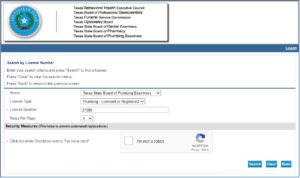
If you want to see a list of registered plumbing companies near you that are headed by an RMP, then the TSBPE has an interactive plumber locating map that is very user-friendly.

Using these tools, you can make sure the company you are using is offering plumbing services legally in the State of Texas. Furthermore, you can also check to make sure that every plumber a company sends out to your house actually holds a license of their own and has gone through at least the required level of training required. The database will also tell you if the license has expired or is under disciplinary actions.
While it is vital to choose a plumber whose business is abiding by Texas law, not all plumbing companies are created equal. If you haven’t found your preferred plumbing provider yet, or if you need to find another company for scheduling reasons, there are a couple of good ways of going about it.
The tried-and-true way of finding a good service contractor is to ask your neighbors for their recommendations. This method has the advantage of getting information from a real person who doesn’t have a conflict of interest. It also confirms that the recommended plumber serves your area.
New apps and online platforms are seeking to bring this method to the digital age. For example, many people trust recommendations from their neighbors on the Nextdoor app.
Outside of this, the next best way to vet a plumbing company is to read online reviews from various sources. Google, Yelp, and other review aggregators tend to have the largest number of reviews to go off of.
 While quantity of reviews and average star rating is a good place to start, it is important to read individual reviews for yourself. A lot of reviews may reflect more of the company’s marketing and reputation management sophistication than of the company’s true service.
While quantity of reviews and average star rating is a good place to start, it is important to read individual reviews for yourself. A lot of reviews may reflect more of the company’s marketing and reputation management sophistication than of the company’s true service.
Here are some things to consider:
The TSBPE currently issues four different plumbing licenses in the State of Texas: Tradesman Plumber-Limited, Journeyman, Master, and Plumbing Inspector. In addition to this, there are different registrations and different endorsements that can be added to a license. Why so many? What do they mean? Here’s a quick breakdown for you:
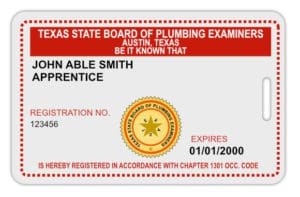
Registering as a Plumbing Apprentice is pretty simple. All you have to do is meet certain basic requirements, fill out a form, and pay a small fee.
Once registered with the TSBPE, an apprentice is allowed to learn, practice, and assist with plumbing work as long as they are directly supervised by a licensed plumber. This means the plumber must be onsite with them at all times unless they are just performing basic manual labor.
These registrations allow apprentices privileges they wouldn’t normally have as long as they meet certain qualifications. Although different depending on the registration, these qualifications usually involve a certain amount of hours of experience as well as passing some sort of test.
A Drain Cleaner-Restricted registration gives an apprentice freedom to unclog drains through existing openings/cleanouts without needing a licensed plumber present.
The regular Drain Cleaner registration allows the apprentice to install and alter certain cleanouts (openings) in the course of their work of unclogging stopped drains.
A Residential Utilities Installer registration allows an apprentice to install water and sewer lines in the yard for typical residential homes.
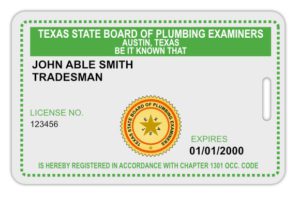
The Tradesman license is the easiest license to earn that permits the licensee to perform actual plumbing work without the direct supervision of a higher-level license.
The only catch is that Tradesman plumbers can only work on typical residential homes. They cannot work on commercial facilities or multi-family structures like apartment complexes. Of course, even on residential homes, they must still be working under an RMP (Responsible Master Plumber). However, the RMP does not need to be onsite.
Although there are a few caveats to some of the requirements, the typical way a plumber earns this license is by accruing at least 4,000 hours of experience in the plumbing trade, taking multiple approved training courses, and then taking a final examination that is partly practical and partly written.
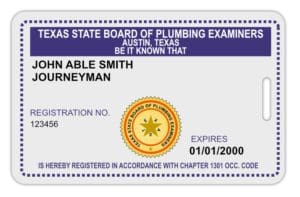 Although many residential service plumbers don’t pursue a higher license because it isn’t necessary for their daily work, the next level of plumbing license available is that of Journeyman Plumber. This license gives the plumber the ability to work on any structure as long as they are still under the oversight of an RMP.
Although many residential service plumbers don’t pursue a higher license because it isn’t necessary for their daily work, the next level of plumbing license available is that of Journeyman Plumber. This license gives the plumber the ability to work on any structure as long as they are still under the oversight of an RMP.
In order to earn the Journeyman License, a total of 8,000 hours of plumbing experience must be accrued as well as additional mandatory classes covering both residential and commercial plumbing code. As with the Tradesman License, getting a Journeyman License also requires taking a skills/knowledge test.
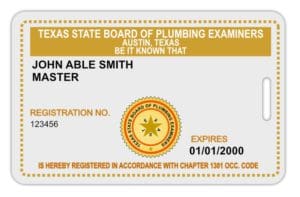 “Master Plumber” is the license that is the most prestigious. It is also the license that requires the most knowledge and experience. In order to earn a Master License, a plumber has to have held the Journeyman license for at least 4 years. They also must pass an advanced examination on plumbing code.
“Master Plumber” is the license that is the most prestigious. It is also the license that requires the most knowledge and experience. In order to earn a Master License, a plumber has to have held the Journeyman license for at least 4 years. They also must pass an advanced examination on plumbing code.
Ironically, the Master License by itself doesn’t give hardly any more privileges than the Journeyman License. That is why many plumbers don’t pursue this license. The main practical benefit to earning the Master License is that it opens the door to owning a plumbing company with the addition of the RMP designation (which has a few more requirements).
Outside of that, the biggest reason why plumbers earn this license is for the distinction of the title.
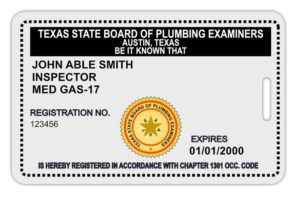 The plumbing inspections process is an important part of plumbing safety in Texas. Third-party plumbing inspectors that are employed by or contracted by cities provide accountability to plumbers out in the field.
The plumbing inspections process is an important part of plumbing safety in Texas. Third-party plumbing inspectors that are employed by or contracted by cities provide accountability to plumbers out in the field.
Most cities require plumbing permits to be “pulled” before a local plumbing company performs larger jobs like replacing a water heater or installing a new water service line. Once these permits are on file, a plumbing inspector is sent out to check the work for compliance with all state and local plumbing codes. They will either “pass” or “fail” the work.
In order to get a Plumbing Inspector license, one must have a certain amount of training and plumbing experience. Many are career plumbers who have retired from field work. One also has to take an exam that tests thorough knowledge of plumbing code.
To be clear, a plumbing inspector is different from a home inspector that you would use during real estate transactions. Plumbing inspectors are contracted specifically by the the cities to inspect new construction plumbing installations as well as larger plumbing improvements/renovations.
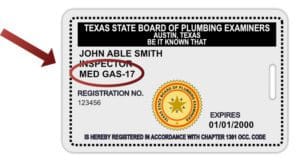 For the individual licensed as a Journeyman, Master, or Inspection, there are three different “endorsements” that can be added to their license which indicate specialized training and allow extended privileges.
For the individual licensed as a Journeyman, Master, or Inspection, there are three different “endorsements” that can be added to their license which indicate specialized training and allow extended privileges.
The Medical Gas Piping Installation endorsement is earned through taking a course and passing an examination. It gives the plumber authority to install piping that carries natural gas used for medical purposes. They must work under an RMP who also holds this endorsement.
The Multipurpose Residential Fire Protection Sprinkler Specialist endorsement has a long-winded title, but the privileges are pretty simple. It allows the plumber to install a fire sprinkler system in a typical residential home (under an RMP with the same endorsement). It also requires a training course and passing an exam.
Finally, the Water Supply Protection Specialist endorsement also just requires a training course and exam to earn. With it comes the privilege of working on plumbing that is designed specifically for treating and using rainwater to supply plumbing fixtures.
The predominant image of a plumber in the average homeowner’s mind is of a tradesman who works on a home’s water and sewer pipes. But plumbers are actually trained to work on gas systems too. This is arguably the most important aspect of plumbing code and training. Gas leaks are everywhere, and under the right conditions they can turn deadly.
Plumbers know how to safely install the various gas piping systems inside the house as well as to locate and repair any gas leaks that develop. Natural Gas is the fuel that keeps about 35% of all Texas homes warm during the winter. Plumbers with the standard Tradesman, Journeyman, and Master licenses are authorized to work on these systems.
However, there is another type of gas used as a heat source in Texas. Although much less common, Propane (LP gas) is used to heat about 3% of homes in Texas.
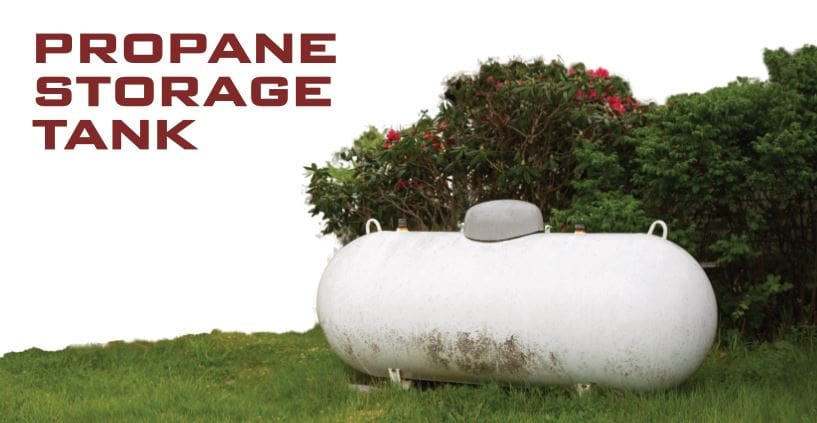
Historically, the transportation and use of Propane in Texas has been regulated by the Texas Railroad Commission. For this reason, plumbers need an additional registration with the Railroad Commission in order to work on Propane systems and equipment.
Although Propane is very similar to Natural Gas, they are different enough to warrant a separate body of rules that must be followed when installing or working on LP systems.
Septic Systems (also called On-Site Sewage Facilities) have their own set of rules and requirements which are administered by the Texas Commission On Environmental Quality. Because these systems can create a safety and environmental hazard, special rules and processes must be followed.
The TCEQ has their own system of licensing and regulation – issuing licenses like Site Evaluator, Installer I, Installer II, and Maintenance Technician. All of these require their own set of prerequisites, education, and testing.
Many plumbing companies in rural areas of Texas have these septic system licenses and work on both the house’s plumbing systems and the onsite septic systems.
While a plumber who is properly licensed by the TSBPE can work anywhere in Texas with his license, most cities require that contractors be registered with them in order to pull permits and schedule inspections in their city.
It doesn’t matter if the plumber operates his own company or works under another, that company must be properly registered with every city in its service area.
Many city websites host portals where residents can look up contractors who are registered in their city and keep tabs on permits/inspections. For instance, Frisco, Plano, and Prosper all use the eTRAKiT platform for this purpose.
At the end of the day, if a contractor pulls a permit and schedules an inspection with your city in order to perform work at your home, you can rest assured that this contractor is registered with the city and in good standing.
If a contractor is performing a large installation such as for a water heater, remodel, or renovation at your home and does not talk with you about permits and the inspection process, this is a red flag. The city permitting and inspection system is set up so that homeowners like you can be protected from sub-par construction practices that violate code requirements.
At Legacy Plumbing, we’re committed to do things by the book. All of our plumbers are licensed and properly trained. All of our Apprentices are registered and actively working toward earning their own plumbing licenses.
Hopefully, this article helped you learn more about the licensing system for Texas plumbers. If you have further questions about our licenses or the plumbing services we offer, just give us a call at: 972-632-5412.
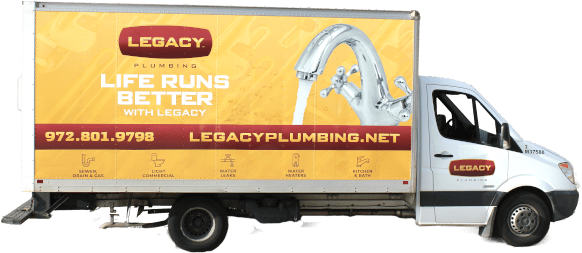
If you found this helpful, please take a minute to share it on social media. Also, feel free to pass this content along to friends/family/clients of yours who may find this helpful.
Headquarters
1101 E Eldorado Pkwy
Little Elm, TX 75068
Legacy Plumbing Frisco
15222 King Road, STE 1002
Frisco, TX 75034
7:30 AM to 5:30 PM
Monday – Friday